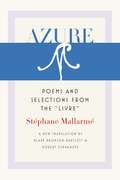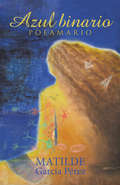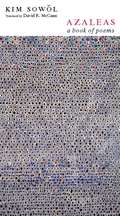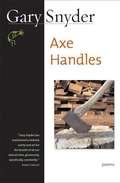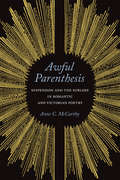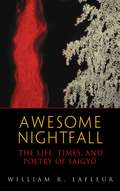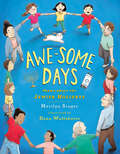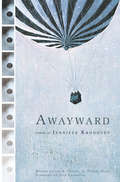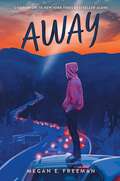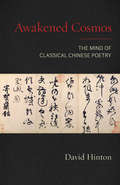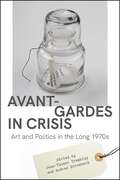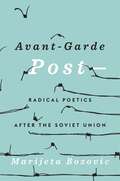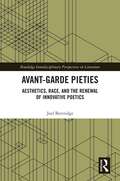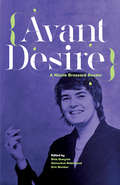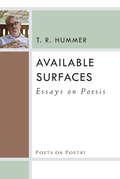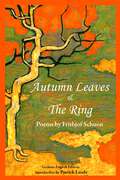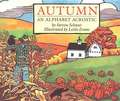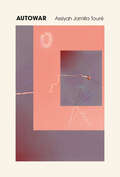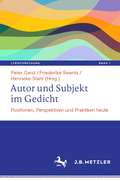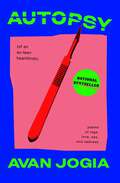- Table View
- List View
Azure: Poems and Selections from the "Livre" (Wesleyan Poetry Series)
by Stéphane Mallarmé Robert Fernandez Blake Bronson-BartlettDuring his lifetime, Stéphane Mallarmé (1842-1898) was recognized as one of the greatest living French poets. He wrote extensively on themes of reality and his desire to turn away from it, marrying form and content in revolutionary ways that departed drastically from the more tightly controlled French tradition. Despite his status as one of the first modernists, much of Mallarmé's radicalism has been lost in translation. Finally, in this new collection by Blake Bronson-Bartlett and Robert Fernandez, the magic and mastery of form and diction, so striking in Mallarmé's French verse, comes to life in English. Drawing from Poésies (1899), Un coup de dés (A Cast of Dice), and the "Livre" (the "Book"--the overarching conceptual work left unfinished at the death of the poet), this collection captures Mallarmé's true linguistic brilliance, bringing the poems into our current history while retaining the music, playfulness, and power of the originals.
Azul binario: Poeamario
by Matilde García Pérez«Una remembranza para los que conocen al amor y un faro para los que esperan encontrarlo.» <P><P>Azul binario pretende compartir con sus lectores un trayecto de vida no solo inesperado sino también delicioso, que seguramente los afectará de maneras diversas, de acuerdo al momento de la vida en que la lectura los atrape: Los que ya abrazaron definitivamente al amor, podrán disfrutarlo al borde de cualquier momento, rememorando tal vez su propia experiencia. <P>Los que todavía lo buscan - o casi han desistido - podrán encontrar entre sus páginas una pequeña muestra de lo que les espera si no desesperan. Matilde García Pérez nos ofrece con Azul binario una nueva presentación. A lo largo de sus páginas se ve la frescura de una manifestación artística manufacturada por alguien que ha vivido intensamente y que habla de un tiempo impreciso, angustioso, exultante, alternativo, decoroso, pleno de amor. Cada poema la muestra como una prisionera de esos momentos, con escasa posibilidad de movilidad. En los escritos está plena de fugas, despojada de palabras inútiles, sin exageraciones ni alternancias, pero trabaja a sabiendas que puede traer unas palabras que nos conduzcan suavemente hacia un abismo probable, a veces desolador, otras ausentes, aunque siempre con la posibilidad de reconstruir un fantasma a punto de difuminarse. «Azul binario es como la insoportable necesidad de la autora de liquidar cuentas con su propio pasado, de obligarse a abandonar ese espacio y dejarlo encerrado en cada poema, como si fuera una cárcel pero con mayores comodidades. Ella vuelve y se retira de ese pasado, lo explora, lo regresa al ámbito privado, íntimo, para dejarlo como una bestia que ronda herida, desquiciada, al acecho. Y los espectadores somos sus lectores, que avizoramos ese resplandor lejano de la vida de Matilde.» Ricardo Bocos
Azul
by Rubén DaríoEl poeta nicaragüense fue, sin duda alguna, uno de los poetas hispanoamericanos que más decididamente cambió el rumbo de las letras hispánicas. Publicó sus primeros versos a los once años, y a finales del siglo XIX, ya consagrado, publicó "Azul", obra con la que se inició «oficialmente» el Modernismo Hispanoamericano.
Azha.Valliyappa
by poovannanThis book is a monograph in Tamil on Children’s Poet, Azha.Valliyappa, popularly known as 'Kuzhanthai Kavignar' who wrote plenty of simple and enjoyable rhymes for children.
Azaleas: A Book of Poems (Weatherhead Books on Asia)
by Kim SowolAvailable for the first time in English, Azaleas is a captivating collection of poems by a master of the early Korean modernist style. Published in 1925, Azaleas is the only collection Kim Sowol (1902-1934) produced during his brief life, yet he remains one of Korea's most beloved and well-known poets. His work is a delightful and sophisticated blend of the images, tonalities, and rhythms of traditional Korean folk songs with surprisingly modern forms and themes. Sowol is also known for his unique and sometimes unsettling perspective, expressed through loneliness, longing, and a creative use of dream imagery-a reflection of Sowol's engagement with French Symbolist poetry.Azaleas recounts the journey of a young Korean as he travels from the northern P'yongyang area near to the cosmopolitan capital of Seoul. Told through an array of voices, the poems describe the young man's actions as he leaves home, his experiences as a student and writer in Seoul, and his return north. Although considered a landmark of Korean literature, Azaleas speaks to readers from all cultures. An essay by Sowol's mentor, the poet Kim Ok, concludes the collection and provides vital insight into Sowol's work and life. This elegant translation by David R. McCann, an expert on modern Korean poetry, maintains the immediacy and richness of Sowol's work and shares with English-language readers the quiet beauty of a poet who continues to cast a powerful spell on generations of Korean readers.
Axe Handles
by Gary Snyder"One principle motif of Axe Handles, Gary Snyder's sixth collection of poems, is the axiom of Lu Ji, "In making the handle of an axe by cutting wood with an axe the model is indeed near at hand." This collection is an exploration of discovery, of insight and of vision. These poems discover the roots of community in the family and the roots of culture and government in the community."--BOOK JACKET.Title Summary field provided by Blackwell North America, Inc. All Rights Reserved
Awful Parenthesis: Suspension and the Sublime in Romantic and Victorian Poetry
by Anne C. McCarthyWhether the rapt trances of Romanticism or the corpse-like figures that confounded Victorian science and religion, nineteenth-century depictions of bodies in suspended animation are read as manifestations of broader concerns about the unknowable in Anne C. McCarthy’s Awful Parenthesis. Examining various aesthetics of suspension in the works of poets such as Coleridge, Shelley, Tennyson, and Christina Rossetti, McCarthy shares important insights into the nineteenth-century fascination with the sublime. Attentive to differences between "Romantic" and "Victorian" articulations of suspension, Awful Parenthesis offers a critical alternative to assumptions about periodization. While investigating various conceptualizations of suspension, including the suspension of disbelief, suspended animation, trance, paralysis, pause, and dilatation, McCarthy provides historically-aware close readings of nineteenth-century poems in conversation with prose genres that include devotional works, philosophy, travel writing, and periodical fiction. Awful Parenthesis reveals the cultural obsession with the aesthetics of suspension as a response to an expanding, incoherent world in crisis, one where the audience is both active participant and passive onlooker.
Awesome Nightfall
by Saigyo William R LafleurAwesome Nightfall: The Life, Times, and Poetry of Saigyo captures the power of Saigyo's poetry and this previously overlooked poet's keen insight into the social and political world of medieval Japan. It also offers a fascinating look into the world of Japanese Buddhism prior to the wholesale influence of Zen.
Awe-some Days: Poems about the Jewish Holidays
by Marilyn SingerDiscover and celebrate all of the Jewish holidays with this warm and engaging poetry collection by the acclaimed author of Mirror Mirror.In this cheerful, enjoyable poetry collection, a family decides to celebrate every Jewish holiday for a full year, &“the ones we know well, the ones we do not.&” Starting with new-year apples dipped in honey on Rosh Hashanah all the way to flowers and chocolates on Tu B&’Av (often called &“Jewish Valentine&’s Day&”), readers can explore the joy and meaning of the various holidays along with this lively family of five. A brief explanation of the holiday accompanies each poem. By an award-winning and beloved children&’s poet, this is a wonderful introduction to Jewish celebrations, observances, and days of remembrance.
Awayward (A. Poulin, Jr. New Poets of America)
by Jennifer KronovetIn her foreword to Awayward, National Book Award–winning poet Jean Valentine writes, &“Jennifer Kronovet&’s poems in Awayward are so surprising and compelling and beautiful, so intelligent and felt. Kronovet uses simple words and works at a mysterious depth, one we can enter with gladness.&”Written while Kronovet was living in Beijing, Awayward illuminates the sense of disconnect that travelers experience when their major touchstones of language and geography are altered. These poems wander the world, drifting in and out of conversations that are alternately comical and grave.Jennifer Kronovet is founding co-editor of CIRCUMFERENCE, a journal of poetry in translation.
Away from Home
by Carrie HooperAway from Home In this collection of fifty-six poems, the author, who is blind, shares thoughts on some of her many travels. Part One, A Week at Sea, contains poems about a cruise she took with eight members of her family. Part Two, Other Adventures, includes poems inspired by places she and a friend visited in western New York, a trip to Florida, an unforgettable day in Des Moines, Iowa, and much more.
Away (Alone)
by Megan E. FreemanA group of children investigate the threat that prompted large-scale evacuations in this powerful and dramatic companion novel to the New York Times bestselling Alone told in multiple POVs.After an imminent yet unnamed danger forces people across Colorado to leave their homes, a group of kids including an aspiring filmmaker and a budding journalist find themselves in the same evacuation camp. As they cope with the aftermath of having their world upended, they grow curious about the mysterious threat. And as they begin to investigate, they start to discover that there&’s less truth and more cover-up to what they&’re being told. Can they get to the root of the conspiracy, expose the bad actors, and bring an end to the upheaval before it&’s too late?
Awakened Cosmos: The Mind of Classical Chinese Poetry
by David HintonA deep and radically original exploration of Taoist and Ch'an (Zen) Buddhist wisdom through the lens of the life and work of Tu Fu, widely considered China's greatest classical poet.What is consciousness but the Cosmos awakened to itself? This question is fundamental to the Taoist and Ch'an (Zen) Buddhist worldview that shapes classical Chinese poetry. A uniquely conceived biography, Awakened Cosmos illuminates that worldview through the life and work of Tu Fu (712-770 C.E.), China's greatest classical poet. Tu Fu's writing traces his life from periods of relative normalcy to years spent as an impoverished refugee amid the devastation of civil war. Exploring key poems to guide the reader through Tu Fu's dramatic life, Awakened Cosmos reveals Taoist/Ch'an insight deeply lived across the full range of human experience.Each chapter presents a poem in three stages: first, the original Chinese; then, an English translation in Hinton's masterful style; and finally, a lyrical essay that discusses the untranslatable philosophical dimensions of the poem. The result is nothing short of remarkable: a biography of the Cosmos awakened to itself in the form of a magisterial poet alive in T'ang Dynasty China.Thirty years ago, David Hinton published America's first full-length translation of Tu Fu's work. Awakened Cosmos is published simultaneously with a newly translated and substantially expanded version of that landmark translation: The Selected Poems of Tu Fu: Expanded and Newly Translated (New Directions).
Avidly Reads Poetry
by Jacquelyn Ardam“Poetry has leapt out of its world and into the world”Poetry is everywhere. From Amanda Gorman performing “The Hill We Climb” before the nation at Joe Biden’s Presidential inauguration, to poems regularly going viral on Instagram and Twitter, more Americans are reading and interacting with poetry than ever before. Avidly Reads Poetry is an ode to poetry and the worlds that come into play around the different ways it is written and shared.Mixing literary and cultural criticism with the author’s personal and often intimate relationship with poetry, Avidly Reads Poetry breathes life into poems of every genre—from alphabet poems and Shakespeare’s sonnets to Claudia Rankine’s Citizen and Rupi Kaur’s Instapoetry—and asks: How do poems come to us? How do they make us feel and think and act when they do? Who and what is poetry for? Who does poetry include and exclude, and what can we learn from it?Each section links a reason why we might read poetry with a type of poem to help us think about how poems are embedded in our lives, in our loves, our educations, our politics, and our social media, sometimes in spite of, and sometimes very much because of, the nation we live in.Part of the Avidly Reads series, this slim book gives us a new way of looking at American culture. With the singular blend of personal reflection and cultural criticism featured in the series, Avidly Reads Poetry shatters the wall between poetry and “the rest of us.”
Avant-Gardes in Crisis: Art and Politics in the Long 1970s
by Jean-Thomas Tremblay; Andrew StrombeckAvant-Gardes in Crisis claims that the avant-gardes of the late twentieth and early twenty-first centuries are in crisis, in that artmaking both responds to political, economic, and social crises and reveals a crisis of confidence regarding resistance's very possibility. Specifically, this collection casts contemporary avant-gardes as a reaction to a crisis in the reproduction of life that accelerated in the 1970s—a crisis that encompasses living-wage rarity, deadly epidemics, and other aspects of an uneven management of vitality indexed by race, citizenship, gender, sexual orientation, class, and disability. The contributors collectively argue that a minoritarian concept of the avant-garde, one attuned to uneven patterns of resource depletion and infrastructural failure (broadly conceived), clarifies the interplay between art and politics as it has played out, for instance, in discussions of art's autonomy or institutionality. Writ large, this book seeks to restore the historical and political context for the debates on the avant-garde that have raged since the 1970s.
Avant-Garde Post–: Radical Poetics after the Soviet Union
by Marijeta BozovicThe remarkable story of seven contemporary Russian-language poets whose experimental work anchors a thriving dissident artistic movement opposed to both Putin’s regime and Western liberalism.What does leftist art look like in the wake of state socialism? In recent years, Russian-language avant-garde poetry has been seeking the answers to this question. Marijeta Bozovic follows a constellation of poets at the center of a contemporary literary movement that is bringing radical art out of the Soviet shadow: Kirill Medvedev, Pavel Arseniev, Aleksandr Skidan, Dmitry Golynko, Roman Osminkin, Keti Chukhrov, and Galina Rymbu. While their formal experiments range widely, all share a commitment to explicitly political poetry. Each one, in turn, has become a hub in a growing new-left network across the former Second World.Joined together by their work with the Saint Petersburg–based journal [Translit], this circle has staunchly resisted the Putin regime and its mobilization of Soviet nostalgia. At the same time, the poets of Avant-Garde Post– reject Western discourse about the false promises of leftist utopianism and the superiority of the liberal world. In opposing both narratives, they draw on the legacies of historical Russian and Soviet avant-gardes as well as on an international canon of Marxist art and theory. They are also intimately connected with other artists, intellectuals, and activists around the world, collectively restoring leftist political poetry to global prominence.The avant-garde, Bozovic shows, is not a relic of the Soviet past. It is a recurrent pulse in Russophone—as well as global—literature and art. Charged by that pulse, today’s new left is reimagining class-based critique. Theirs is an ongoing, defiant effort to imagine a socialist future that is at once global and egalitarian.
Avant-Garde Pieties: Aesthetics, Race, and the Renewal of Innovative Poetics (Routledge Interdisciplinary Perspectives on Literature)
by Joel BettridgeAvant-Garde Pieties tells a new story about innovative poetry; it argues that the avant-garde-now more than a century old-persists in its ability to nurture interesting, provocative, meaningful, and moving poems, despite its profound cultural failings and its self-devouring theoretical compulsions. It can do so because a humanistic strain of its radical poetics compels adherents to argue over the meaning of their shared political and aesthetic beliefs. In ways that can be productively thought of as religious in structure, this process fosters a perpetual state of crisis and renewal, always returning innovative poetry to its founding modernist commitments as a way to debate what the avant-garde is-what it should and does look like, and what it should and does value. Consequently, Avant-Garde Pieties makes way for a radical poetics defined not by formal gestures, but by its debate with itself about itself. It is a debate that honors the tradition's intellectual founding as well as its cultural present, which includes aesthetic multiformity, racialized and gendered modes of authorship, experiences of the sacred, political activism, and generosity in critical disagreement.
Avant Desire: A Nicole Brossard Reader
by Nicole BrossardIn June 2019, Nicole Brossard was awarded the Lifetime Recognition Award from the Griffin Poetry Trust. Rarely has a prize been so richly deserved. For five decades she has writing ground-breaking poetry, fiction, and criticism in French that has always been steadfastly and unashamedly feminist and lesbian. <P><P> Avant Desire moves through Brossard’s body of work with a playful attentiveness to its ongoing lines of inquiry. Like her work, this reader moves beyond conventional textual material to include ephemera, interviews, marginalia, lectures, and more. Just as Brossard foregrounds collaboration, this book includes new translations alongside canonical ones and intertextual and responsive work from a variety of artist translators at various stages of their careers. <P><P> Through their selections, the editors trace Brossard’s fusion of lesbian feminist desire with innovation, experimentation, and activism, emphasizing the more overtly political nature of her early work and its transition into performative thinking. <P><P> Devotees of Brossard will be invigorated by the range of previously unavailable materials included here, while new readings will find a thread of inquiry that is more than a mere introduction to her complex body of work. Avant Desire situates Brossard’s thinking across her oeuvre as that of a writer whose sights are always cast toward the horizon.
Available Surfaces: Essays on Poesis
by Hummer T. R."T. R. Hummer grew up in the Deep South and planned to become a musician before he met poetry. This musical influence is visible in his work: he often discusses poetry together with music (and sometimes the other way around), and his career has included both writing and performance. The present volume, Available Surfaces, focuses on the art of making both poetry and music and on the concept of "making" as well. Hummer draws on childhood experiences ("A Length of Hemp Rope"), adult experiences ("Hotel California"), experiences as a poet ("Available Surfaces"), and experiences as an explorer of unworldly spaces ("The Hive," "Brain Wave and the End of Science Fiction"). Hummer has published ten volumes of poetry with presses including Louisiana State University Press and the University of Illinois Press. His work has appeared in two anthology volumes published by Simon & Schuster and Cengage and in two Pushcart Prize anthologies. He has edited the Kenyon Review, the Georgia Review, and the Cimarron Review, among other journals. "--
Autumn and Other Landscapes
by Pradip Acharya Hiren BhattacharyyaLife, works and poems of Hiren Bhattacharyya.
Autumn Leaves & The Ring: Poems By Frith
by Frithjof SchuonDuring the last three years of his life Frithjof Schuon wrote approximately 3,500 short poems in his mother tongue German. These poems, which have been called &“metaphysical music,&” cover every possible aspect of spiritual doctrine, practice and virtue, as well as the role and function of beauty. They express every conceivable subtlety of spiritual and moral counsel – and this is not merely in general terms, but with uncanny intimacy, detail and precision. They express the same unerring sharpness of intellect, profundity, comprehensiveness and compassion which one finds in the range of Schuon&’s better-known dialectical writings.This book contains two collections, Autumn Leaves and The Ring, and is offered here for the first time in a bilingual English-German edition. The various sections include: Beauty, Human Questions, Doctrine, Recollections, Images, and the Soul. In these poetic teachings Schuon speaks directly to the reader, expressing every conceivable subtlety of spiritual and moral counsel. They comfort and inspire the reader to cultivate inner beauty and seek a deeper consciousness of the presence of God.
Autumn
by Steven SchnurOne brief acrostic poem for each letter of the alphabet from acorn to zero follows the fall season from end of summer to chilly conclusion.
Autowar
by Assiyah Jamilla TouréA visceral, vital, unblinking debut collection of poems exploring kinesthetic memory and longing, inherited violence, and the body as a geographical site. We're often told that we are given only what we can bear. For some of us our first lessons are in how much pain we're made to think we deserve—and the resulting scars are always meant to be kept secret. Assiyah Jamilla Touré's debut collection is a record of those scars—not those inflicted on us by the thousands of little wars we live in everyday, but those that come afterwards, those we inflict upon ourselves to mark the path. Each and every poem in Autowar was written on a cell phone, transcribing an urgent revisiting of old sites of pain, and also a revisiting of one young person’s power and ability—to hurt themself, or others. These poems are powerful evocations of how even our scars have worlds and lives. here in the dark, me-spacei am insatiable for my fleshi just can't get enoughof tiny after-woundsthat's me giving, still too softfor my own teeth
Autor und Subjekt im Gedicht: Positionen, Perspektiven und Praktiken heute (Lyrikforschung. Neue Arbeiten zur Theorie und Geschichte der Lyrik #1)
by Friederike Reents Peter Geist Henrieke StahlDas seit jeher spannungsreiche Verhältnis zwischen Autor und Subjekt bildet in der Gegenwartslyrik ein Experimentierfeld, das eine Herausforderung für die Lyriktheorie darstellt. Die Beiträge diskutieren zentrale Positionen zu den Konzepten ‚abstrakter Autor‘ und ‚lyrisches Subjekt‘ unter Berücksichtigung ihrer unterschiedlichen Genese sowie Terminologie in den verschiedenen Philologien. Aus der Gedichtanalyse werden Perspektiven oder Alternativen zu diesen Konzepten entwickelt, um ein Instrumentarium zur Beschreibung der neuen Autor-Subjekt-Relationen in der Lyrik zu gewinnen. Der Band mit germanistischen, slavistischen, anglistischen und komparatistischen Beiträgen ist Ergebnis des DFG-Projekts zur „Typologie des Subjekts in der russischen Dichtung der 1990-2010er Jahre“ und der DFG-Kollegforschungsgruppe „Russischsprachige Lyrik in Transition – Poetische Formen des Umgangs mit Grenzen der Gattung, Sprache, Kultur und Gesellschaft zwischen Europa, Asien und Amerika“.
Autopsy (of an Ex-Teen Heartthrob): (poems of rage, love, sex, and sadness)
by Avan JogiaWriter, director, and actor Avan Jogia delivers a bright and acidic poetry collection on fame, rage, love, and sadness. A biting postmortem of the modern age, for fans of Lana Del Rey and Atticus.Avan Jogia grew up as a teen idol. He stumbled into the spotlight during the birth of the internet, the early days of Instagram and Twitter, before everyone online was a star. He spent his time in that spotlight writing, observing the cult of celebrity, the hilarity, the absurdity, and sometimes sinister side of being idolized before you&’ve even had the chance to decide for yourself who you are. Now, in his most revealing and honest work to date, he has assembled a book of poems as an act of self-dissection. Part boozy lovesick rage and part personal reflection on the nature of fame, Autopsy (of an Ex-Teen Heartthrob) is a sharp, tantalizing collection of poems examining Avan&’s relationship with ego, idolatry, love as an act of worship, rage as an act of prayer, and sadness as confession. Through vivid imagery (and sometimes startling honesty) Avan cuts himself open and observes the false gods he has worshipped, the ways he has sinned, and exhumes a version of himself that looks like someone we all know: a person searching for the means to cure pain, mend the wounds of insecurity, and satiate cravings for love.
